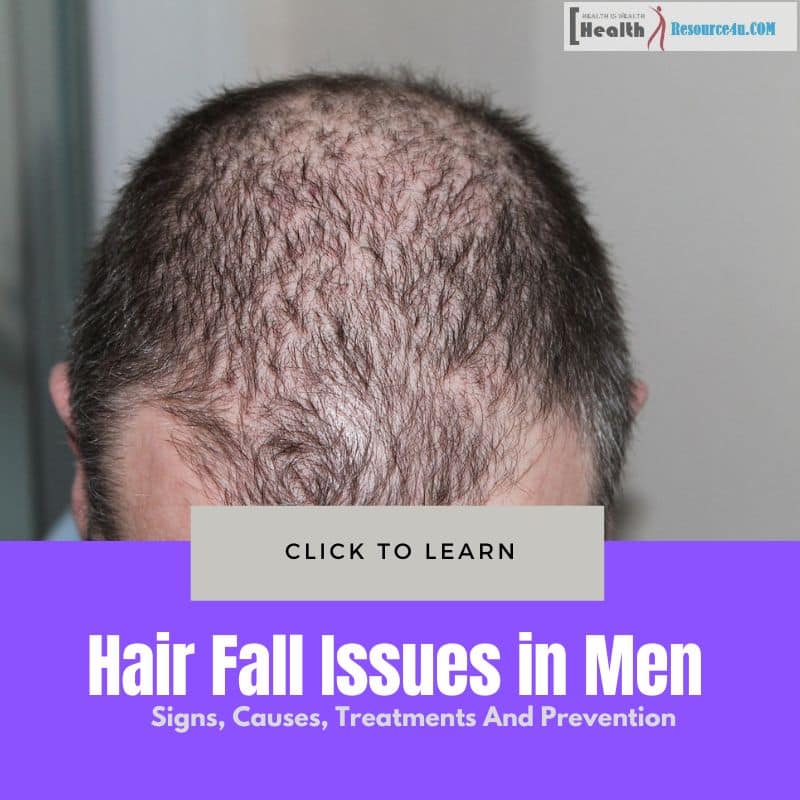Male pattern baldness (MAA) is the most common type of hair loss in men. It affects approximately 30-50% of men by the age of 50. It occurs in a highly reproducible pattern, preferentially affecting the temples, parietal region, and midfrontal scalp. Although this is a mild skin disease, it can still affect your self-image. MAA is increasingly recognized as a risk factor for atherosclerosis and cardiovascular disease.
In this guide, learn about common concerns about hair loss in men. You will also gain valuable insights and practical information that will help you better understand and effectively manage your hair loss problem.
Signs of hair loss in men
Hair loss in men can be identified by a variety of signs that indicate a decline in hair density and overall hair health. Common signs include:
Receding hairline Thinning on the top of the head Increased hair loss Enlarged lines Smaller hair patches or circular bald spots
If you find any symptoms in you, it is recommended to consult a dermatologist and get help.
Complications associated with hair loss
Hair loss in men can lead to several physical and emotional complications. It is important to recognize these complications and treat them appropriately. Complications include:
1. Low self-esteem
Hair loss can have a huge impact on a man’s self-esteem and confidence. Visible changes in appearance can lead to feelings of self-consciousness and social withdrawal.
2. Increased stress and anxiety
Experiencing hair loss can cause stress and anxiety, especially if it’s a cause for concern. Stress can make hair loss even worse, creating a vicious cycle.
3. Mental distress
Hair loss can cause psychological distress such as depression and frustration. If these feelings become unbearable, it is important to seek support or professional help.
Causes of hair loss in men
Understanding the root causes of hair loss in men is critical for effective management and treatment. Common causes include:
1. Male pattern baldness
This is commonly defined as male pattern baldness and results in possible hair loss in most cases. Hair follicles can become thinner, which can affect the health of your hair. Some genetic factors can also cause this problem.
2. Hormone imbalance
Excess dihydrotestosterone can cause hair loss. This hormone binds to the hair follicle and causes it to shrink, making the hair thinner.
3. Scalp infection
If you suffer from any scalp infections, your hair may become weak and excessive hair loss may occur. This infection may show other signs such as itching, redness, and inflammation.
4. Malnutrition
Malnutrition, especially deficiencies in vitamins and minerals essential for hair health (such as iron, biotin, and zinc), can contribute to hair loss in men.
5. Physical and mental stress
High levels of psychological and physical stress can cause hair loss. Stress alters the normal hair growth cycle and increases hair loss and hair loss.
Effective treatment for hair loss
When it comes to treating hair loss in men, several options have shown promising results. These treatments aim to slow hair loss, promote hair growth, and improve overall hair health. Effective treatments include:
1. Medicine
Medications such as minoxidil and finasteride are approved by the FDA to treat hair loss in men. Minoxidil helps promote hair growth, while finasteride inhibits the conversion of testosterone to DHT.
2. Hair transplant
It is the best solution for your bald scalp. In this procedure, hair follicles from the sides or back of the scalp are transplanted to the bald area.
3. Low-level laser treatment
This is a non-invasive procedure that can reliably regrow lost hair. It also promotes healthier hair by increasing blood flow to the hair follicles.
4. Platelet-rich plasma (PRP) therapy
In PRP therapy, platelet-rich plasma extracted from the patient’s own blood is injected into the scalp. Contains growth factors that stimulate hair growth and improve hair density.
Home remedies for hair loss
In addition to medical treatment, certain home remedies can supplement efforts to reduce hair loss. These treatments help nourish hair, strengthen hair follicles, and promote healthy growth. Here are some effective home remedies.
1. Scalp massage
Massaging your scalp frequently will improve blood flow, relax you and keep your hair follicles healthy. You can further enhance the effect by using natural oils such as coconut oil or almond oil.
2. Aloe Vera
This is also a natural remedy for hair. This natural gel instantly soothes infections, moisturizes hair, and strengthens hair follicles. Aloe vera also contains vitamins, minerals, and enzymes that are great for hair health.
3. Onion juice
Onion juice contains sulfur compounds that stimulate hair growth. Apply onion juice on your scalp and leave it on for 30 minutes before washing it off.
4. Balanced diet
This may include protein, fruits, vegetables, and healthy fats. All of these ingredients are very important for maintaining optimal hair health.
conclusion
The problem of hair loss in men can be a nuisance, but with the right knowledge and approach, it can be managed and dealt with effectively. By understanding the signs, causes, and available treatments, you can improve your hair health. Trying some safe home remedies can help you maintain healthy hair and prevent further hair loss. Always consult your health care professional for personalized advice and guidance tailored to your specific needs.
FAQ
1. Can stress cause hair loss in men?
For men, stress can cause problems with excessive hair loss. This disrupts your hair’s natural growth cycle and causes more hair to fall out.
2. Are there any natural remedies for hair loss?
Yes, some natural remedies can supplement medical treatments for hair loss. Examples of effective home remedies include scalp massage, aloe vera, and onion juice.
3. Can diet affect hair loss in men?
A diet rich in essential vitamins and minerals definitely guarantees healthy hair. Improper diet can lead to health problems such as hair loss.


